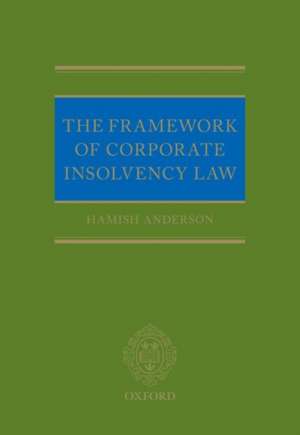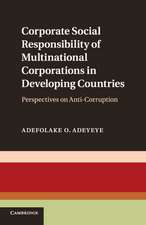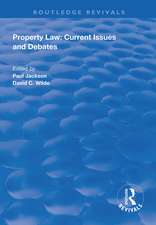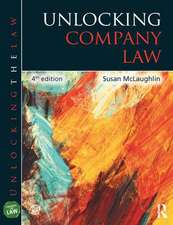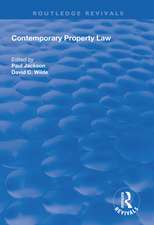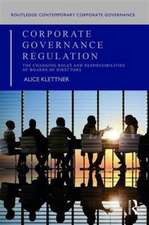The Framework of Corporate Insolvency Law
Autor Hamish Andersonen Limba Engleză Hardback – 11 mai 2017
Preț: 1172.77 lei
Preț vechi: 1691.37 lei
-31% Nou
Puncte Express: 1759
Preț estimativ în valută:
224.44€ • 233.45$ • 185.29£
224.44€ • 233.45$ • 185.29£
Carte disponibilă
Livrare economică 13-19 martie
Preluare comenzi: 021 569.72.76
Specificații
ISBN-13: 9780198805311
ISBN-10: 0198805314
Pagini: 352
Dimensiuni: 181 x 248 x 26 mm
Greutate: 0.77 kg
Editura: OUP OXFORD
Colecția OUP Oxford
Locul publicării:Oxford, United Kingdom
ISBN-10: 0198805314
Pagini: 352
Dimensiuni: 181 x 248 x 26 mm
Greutate: 0.77 kg
Editura: OUP OXFORD
Colecția OUP Oxford
Locul publicării:Oxford, United Kingdom
Recenzii
This book is ... of interest to both academics and practitioners, as well as to any persons who have a true interest in investigating the structure of the existing insolvency system and in questioning its adequacy for the new challenges of the 21st century.
In my view this scholarly, yet practical, book should be required reading for all insolvency practitioners.
The book has a clear structure and is well written. Its concise style and short chapters make it accessible to the reader. It is up to date, reflecting the recent legislative changes to both UK and EU insolvency law and brings a wealth of experience to the discussion. It is this, coupled with the depth of its coverage, that makes this an invaluable text for academics and practitioners alike.
An invaluable work with which no serious practitioner or scholar should be unfamiliar
...this is a valuable book, which all practitioners in corporate insolvency law should read and consult. I foresee that it will often be used in crafting written submissions to the court. As a result, Hamish's concise and accurate explanation of the law may become embedded in judgments and thus part of our corporate insolvency law.
Anderson does an excellent job in eviscerating the rationale that underpins the law while making constant reference to detailed statutory provisions. This is one of the rare cases in which the reader obtains both a holistic and an analytical understanding of the covered topics.
The approach is both insightful and practical and should certainly pique the interest of practitioners specialising in this field in which much has happened over the past forty or so years.
Anderson has set out to write a book that he wished he had had to hand when he started his journey. To take away any uncertainty, I think he past [sic] his self-imposed task gloriously. Practitioners as well as scholars will not be disappointed with the meal served by the author. He typically looks at themes and matters in a more functional, practical way, which Anderson deals with in 22 Chapters.
In my view this scholarly, yet practical, book should be required reading for all insolvency practitioners.
The book has a clear structure and is well written. Its concise style and short chapters make it accessible to the reader. It is up to date, reflecting the recent legislative changes to both UK and EU insolvency law and brings a wealth of experience to the discussion. It is this, coupled with the depth of its coverage, that makes this an invaluable text for academics and practitioners alike.
An invaluable work with which no serious practitioner or scholar should be unfamiliar
...this is a valuable book, which all practitioners in corporate insolvency law should read and consult. I foresee that it will often be used in crafting written submissions to the court. As a result, Hamish's concise and accurate explanation of the law may become embedded in judgments and thus part of our corporate insolvency law.
Anderson does an excellent job in eviscerating the rationale that underpins the law while making constant reference to detailed statutory provisions. This is one of the rare cases in which the reader obtains both a holistic and an analytical understanding of the covered topics.
The approach is both insightful and practical and should certainly pique the interest of practitioners specialising in this field in which much has happened over the past forty or so years.
Anderson has set out to write a book that he wished he had had to hand when he started his journey. To take away any uncertainty, I think he past [sic] his self-imposed task gloriously. Practitioners as well as scholars will not be disappointed with the meal served by the author. He typically looks at themes and matters in a more functional, practical way, which Anderson deals with in 22 Chapters.
Notă biografică
Hamish Anderson is a consultant (formerly a partner) in the Banking Department at Norton Rose Fulbright LLP. His extensive experience covers a range of sectors and both UK and cross-border insolvencies. In addition to representing practitioners, banks, and other creditors, he has also acted for and advised governments and regulators.Hamish has also published extensively and is an Honorary Professor at Nottingham Trent University. He holds an honorary doctorate from Kingston University in recognition of his contribution to the development of insolvency law.
